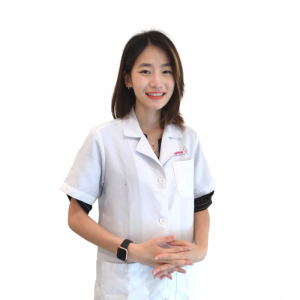
Ms Chong Zhia Ning Angeline, TCM Registered Practitioner, Sunway TCM Centre
Have you ever heard the old Chinese saying, “一孕傻三年”?
It loosely translates to, “Pregnancy makes you silly for three years.” While often said with a laugh, this expression reflects a deeper cultural understanding – that motherhood, while beautiful, can take a toll on mental clarity, and that recovery takes time. But is it real? And how does Traditional Chinese Medicine (TCM) come into play?
Let’s take a closer look.
What Is Mom Brain?
If you have ever found yourself misplacing your phone for the third time in a day, losing your train of thought mid-sentence, or forgetting why you walked into a room, you are not alone. This common, sometimes frustrating experience is what many call “mom brain.”
“Mom brain” is a phrase that describes the brain fog, forgetfulness and slower thinking that many women experience during pregnancy and after childbirth. While it’s often joked about online, science shows it is more than just a meme. Research has found that pregnancy can lead to actual structural changes in the brain, especially in areas linked to memory and social connections. One study published in Nature Neuroscience in 2016 revealed that grey matter volume in mothers’ brains can shrink, and these changes can last for up to two years postpartum [1].
“Mom brain” is a phrase that describes the brain fog, forgetfulness and slower thinking that many women experience during pregnancy and after childbirth.
But there is no need to worry. These changes do not mean your brain is deteriorating; it is actually adapting.
Does It Happen to Everyone?
Not all mothers experience “mom brain”. While some women experience noticeable lapses in memory, reduced attention span, or difficulty focusing, others report feeling mentally sharp throughout pregnancy and postpartum.
Research suggests that these cognitive changes are influenced by a complex interplay of biological, psychological, and lifestyle factors:
Hormonal Fluctuations:
Pregnancy and the postpartum period bring dramatic hormonal shifts, particularly in estrogen, progesterone, cortisol, and oxytocin. These hormones influence brain regions such as the hippocampus and prefrontal cortex, which are involved in memory and executive function. A study in Behavioural Neuroscience (2008) found that hormonal changes during late pregnancy and postpartum can alter spatial memory and attention [2].
Sleep Deprivation:
Sleep disturbances are nearly universal in early motherhood and are strongly linked to impaired cognitive performance. A 2017 study in Nature and Science of Sleep concluded that poor sleep quality in postpartum women is associated with lower cognitive scores, particularly in working memory and processing speed [3].
Stress and Mental Load:
The mental burden of caring for an infant often contributes to cognitive fatigue. Elevated stress hormones such as cortisol have been shown to impair memory retrieval and learning. A 2020 article in Frontiers in Neuroendocrinology emphasised how parenting stress can mediate neuroplastic changes in maternal brains [4].
Nutritional Deficiencies:
Pregnancy and lactation increase nutrient requirements. A randomised trial from Malawi found that higher levels of DHA and vitamin B12 in breastmilk were linked to better performance in verbal fluency and working memory postpartum. [5] Another 2012 trial in Indonesia showed that mothers receiving multiple micronutrient supplements scored significantly higher in overall cognition, comparable to the boost of an extra year of education. [6]
TCM’s View on Mom Brain
In TCM, pregnancy and childbirth consume a great deal of Qi (vital energy) and Blood. These are essential substances that nourish both the body and the mind. After delivery, mothers are in a state of deficiency, particularly in Kidney Essence (肾精) and Heart-Blood (心血), which are closely linked to brain function, memory, and emotion.
The Heart houses the Shen (神), which is the mind/spirit, while the Spleen governs thought, and the Kidney stores Essence, which supports brain development and cognition. So, when these organs are depleted, symptoms of mom brain such as brain fog, forgetfulness, or emotional instability can follow.
General Lifestyle Tips to Prevent or Improve Mom Brain
- Sleep Is Non-Negotiable: Sleep deprivation is a top contributor to cognitive issues. Enlist help to rest whenever you can.
- Simplify Your Schedule: Reduce cognitive overload by using planners, apps, and reminders. Your brain is multitasking 24/7, so give it a break.
- Nutrition Matters: Omega-3 fatty acids (like DHA), iron, vitamin B, and choline are crucial for brain health. Nourishing meals = nourishing the mind.
- Move Your Body: Even gentle walks or yoga can help improve mental clarity by increasing blood flow to the brain.
- Be Kind to Yourself: Memory lapses do not make you a bad mom. They make you human.
TCM Tips to Support Mom Brain
Postpartum Confinement (坐月子):
The traditional 30-to-40-day rest period is more than cultural; it is deeply rooted in TCM principles. After childbirth, the body is in a state of Qi and Blood deficiency. Prioritising rest, staying warm, and avoiding cold exposure helps the body replenish what was lost during labour.
Eat to Nourish the Blood and Essence:
Foods like black sesame, walnuts, red dates, goji berries, bone broth, and duck egg soup are known to nourish the Kidney and Heart systems.
Lifestyle Modifications:
Stay physically warm—wear socks and cover the lower back and abdomen. Limit screen time and overstimulation to rest the Shen (spirit/mind).
Acupressure Massage:
Simple daily acupressure can gently stimulate your Qi, calm your mind, and enhance focus. Apply gentle circular pressure while breathing slowly on the following points for 1–2 minutes each, daily:
Si Shen Cong (四神聪) – Four points around the crown; enhances mental clarity.
Yin Tang (印堂) – Between the eyebrows; calms the mind and relieves stress.
Bai Hui (百会) – Top of the head; lifts Yang, clears the mind.
San Yin Jiao (三阴交) – Inside lower leg, 3 finger-widths above the ankle; nourishes Blood, calms the Shen.
Herbal Support (Under Guidance):
While herbal medicine can play a valuable role in postpartum recovery, it is important to consult a qualified Traditional Chinese Medicine (TCM) practitioner for a personalised prescription. Avoid self-prescribing, especially during breastfeeding, to ensure both safety and effectiveness.

“Mom brain” is not only a natural response to the physical and emotional demands of motherhood; it is a gentle reminder of the profound transformation a mother undergoes. So do not be too hard on yourself. Just as you care for your newborn, remember to take care of yourself, too. With rest, nourishment, and support from TCM, you are simply becoming a stronger, wiser version of yourself.
















